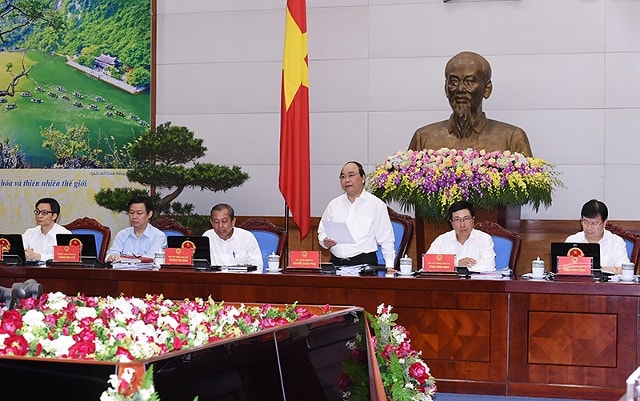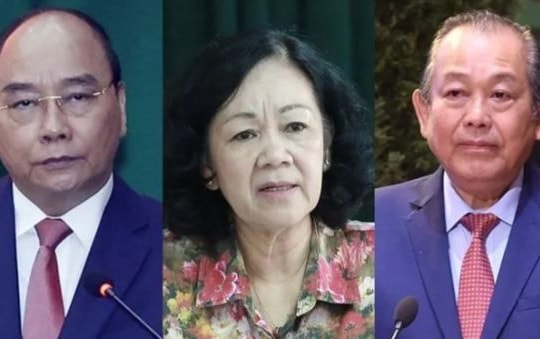Prime Minister requests to rectify Government working procedures
Prime Minister Nguyen Xuan Phuc has just issued a document requesting the rectification of the Government's Working Regulations to strengthen discipline and order, and enhance the sense of responsibility of ministries, branches, and members of the Government.
Anti-missing meetings, meetings on behalf of others, meetings on behalf of others
First of all, the Prime Minister requested that Government members take time to fully attend each regular Government meeting and fully participate in resolutions on issues discussed by the Government.
The Ministers assigned to present the content at the meeting must prepare a summary report that briefly and clearly presents the basic issues of the report, project and issues requiring comments (if any) to save time and focus on the discussion. The discussion is also reminded to be brief, specific, and to the point, clearly expressing agreement or disagreement with the content of the discussion and comments.
 |
| Prime Minister Nguyen Xuan Phuc requested Government members to seriously implement the Government's working regulations. |
Reports and documents must be sent to the Government Office at least 3 days before the meeting. Government members continue to use meeting documents sent via the Government's official email.
From June, the Government Office will send electronic invitations to regular meetings to Government members and relevant agencies at the same time as paper documents, moving towards only sending electronic invitations to all meetings and conferences of the Government and the Prime Minister.
The Prime Minister noted that for meetings of the Government Standing Committee, meetings chaired by the Prime Minister and Deputy Prime Ministers, leaders of ministries and agencies must attend with the correct invited members, and must not send unqualified people to attend the meeting. When requested, meeting attendees must have advisory opinions and proposed opinions on the content related to the functions and tasks of their ministries and agencies. The opinions of meeting attendees are the official opinions of the ministries and agencies and are the basis for the chair to consider and conclude on the meeting content.
In case of necessity, the leader of the ministry or agency attending the meeting may only send one more civil servant of the ministry or agency to attend and must provide full personal information of the civil servant attending the meeting to the Government Office at least one day in advance.
For meetings of the Steering Committee, Committee, and Inter-sectoral Council chaired by the Prime Minister or Deputy Prime Minister, members of these agencies, when invited to the meeting, must attend in the correct composition and participate responsibly in the common work of the unit. In special cases where they cannot attend, they must report to the Prime Minister or Deputy Prime Minister chairing the meeting and authorize a competent person to attend instead, if approved by the Prime Minister or Deputy Prime Minister.
The Prime Minister assigned the Government Office to closely monitor and manage the participants in sessions and meetings; ensure confidentiality of information and documents, especially meetings of the Government Standing Committee; practice thrift and combat waste in the use of documents, limit the use of paper documents in meeting rooms, especially regular Government meetings; continue to promote the application of information technology to serve sessions and meetings.
Pushing the blame onto the Prime Minister
Regarding the implementation of the work program, the Prime Minister requested the Ministers to focus on directing the preparation of projects in the work program of the Government and the Prime Minister; proactively implement procedures, ensure the quality and progress of submitting projects according to plan.
When submitting to the Government, the Prime Minister reviews and gives opinions on projects before submitting them to the Politburo and Secretariat. The National Assembly must simultaneously submit a draft action program and implementation plan of the Government (if any).
Similarly, when submitting draft laws and ordinances, there must be drafts of detailed Decrees; when submitting Decrees for promulgation, there must be drafts of accompanying implementing instructions.
When requesting to withdraw a project from the Work Program or adjust the registered progress, Ministries must clearly explain the reasons and report to the Prime Minister. The Working Regulations also specifically stipulate that Ministries only request to withdraw or adjust the progress of project submission due to objective reasons; projects that have been requested to be withdrawn from the program cannot be re-registered.
To prevent pushing the issue up, the Prime Minister also emphasized that issues that are under the jurisdiction of ministries, ministerial-level agencies, and government agencies should not be submitted to the Prime Minister for resolution. The Government Office will return to the ministries and agencies issues that are not under the Prime Minister's jurisdiction.
The Government Office monitors and compiles detailed statistics on the implementation results of the Work Program of each ministry and agency, and reports at regular monthly Government meetings.
Regarding the responsibility for coordination, the Prime Minister requested that Government members actively contribute. The Government Office will send the Government members' opinion forms, and Government members must study them, give their opinions seriously, and send them back to the Government Office according to regulations within 7 days. In case of no opinion after the deadline, the Government members must be responsible to the Government for the issue asked.
According to Dan Tri


